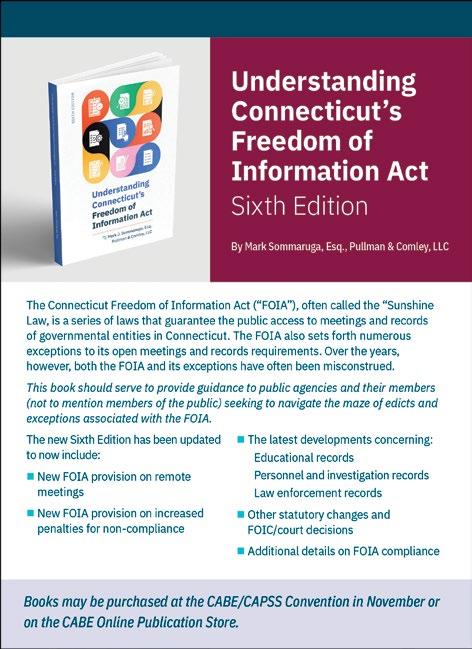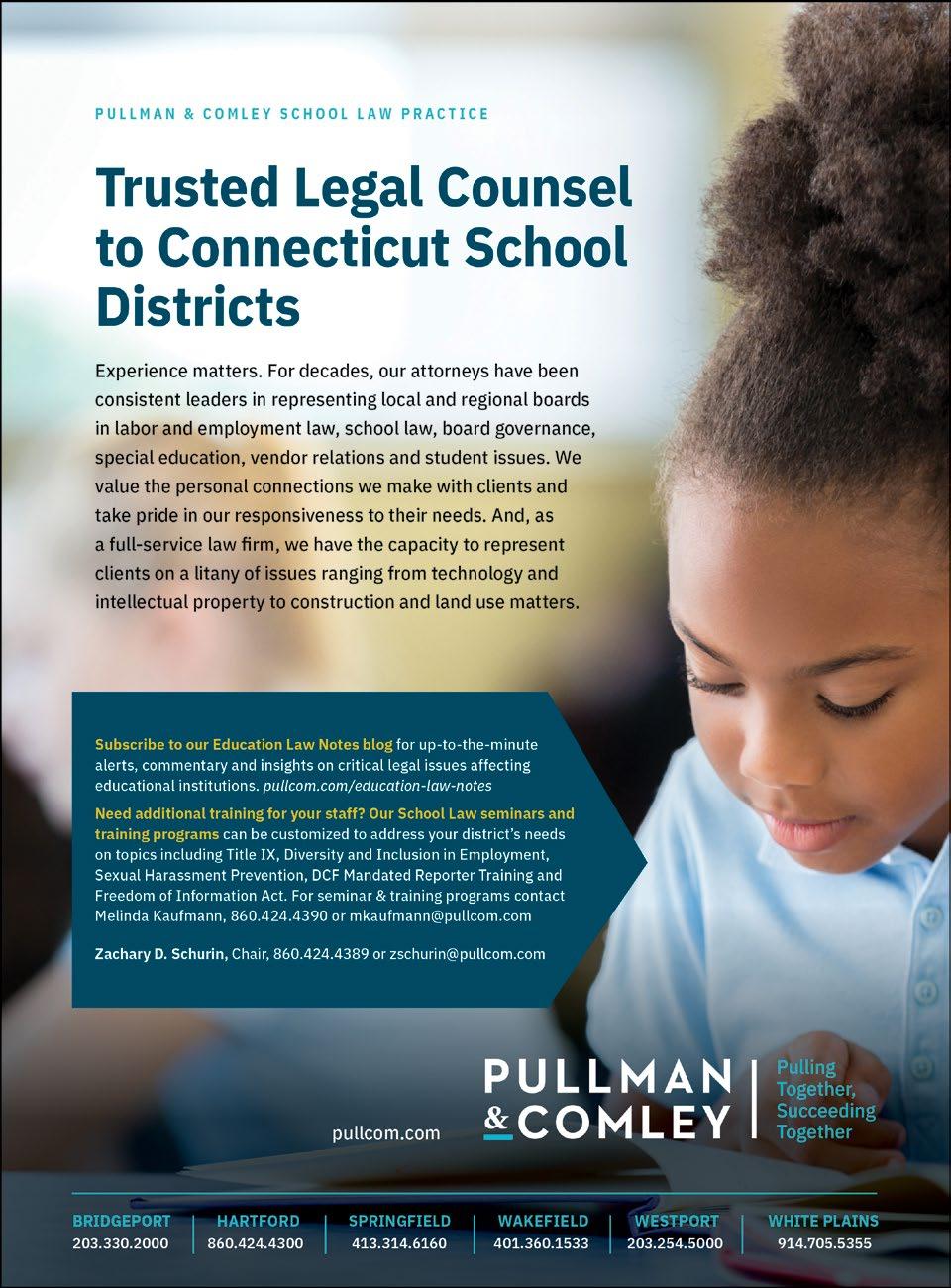







At the recent Annual Conference of the National School Boards Association Connecticut leaders again served in many key roles. CABE President Leonard Lockhart was unanimously elected as NSBA President Elect. Congratulations Leonard!
During the NSBA Delegate Assembly, where the Beliefs, Policies and Resolutions of the Association are adopted annually, CABE was represented by delegates and alternates President Leonard Lockhart (Windsor), First Vice President Meg Scata (Portland), Jaime Barr Shelburn (East Lyme), Seth Klaskin (Madison), Ethel Grant (Naugatuck) and Sara Kelley (Stafford).
Several of CABE’s belief statements were readopted unanimously, including:
• Anti-Hate Speech, which calls on school districts to actively respond to incidents of hate language.
• Civility, which calls upon public officials at all levels of government to model civil discourse, and for school boards to provide opportunities for students to develop their skills in collaborative engagement, conflict resolution, and consensus building.
A number of CABE resolutions were also readopted, including:
• School Safety and Crime Prevention, which calls upon
the Evaluation Committee.
CABE President Leonard Lockhart (Windsor) was elected NSBA President Elect at the NSBA Annual Conference in April. In April 2026 Leonard will become the 4th Connecticut school board member to lead NSBA, following Barbara Reimers (Branford) 1973-74, Leonard Rovins (Westport) 1988-89 and Mary Broderick (East Lyme) 2011-12. The NSBA Nominating Committee endorsed candidates who were judged to be the most outstanding leaders to represent public education and NSBA.
After the election Leonard stated “I’m humbled to serve on the NSBA Board of Directors, representing Connecticut, to help move our educators and students to genius, justice, and joy. I will be advocating for every public educated child within all the states and territories while supporting boards of education with intentional partnership with the state associations. I look forward to fostering working relations for public education.”
Leonard has represented the Eastern Region on the National School Boards Association Board of Directors, as well as serving on the NSBA Policy, Constitution and Bylaws, and Finance committees. He is the current Chair of

In Connecticut, Leonard has served as First Vice President and Vice President for Government Relations, Resolutions Chairman and CABE Area 2 Director. He has been a member of the Windsor Board of Education since 2012, where he has served as Chairman and Vice Chairman. He chaired CABE’s Diversity, Equity and Inclusion Committee and is a graduate of the CABE Leadership Institute. Leonard also represents CABE on the Educator Evaluation and Support Council, Indoor Air Quality Working Group, and serves as Vice Chair of the CREC Council.
Congratulations Leonard!

The committees have finished their committee work for the year (bills may still be referred to committees from the House and Senate) and the focus now is on reading the file copies (bill language, fiscal note and research analysis) in preparation for bringing a bill to the floor for debate and a vote. Within the fiscal note is analysis on the municipal impact of a bill. The information here is mostly culled from your school business officials when looking at education bills. If you are curious about a bill, click on the bill and then on the fiscal note. Check to see what potential costs could be in your district to implement a bill. CABE is adamant in lobbying with the phrase one size does not fit all, all the more reason for CABE to have your local perspective. How will your district be impacted on school meals, on mobile crisis services?
Contact me at smckay@cabe.org if you want to learn more about the issues and process.
CABE Day on the Hill,
Connecticut’s school districts face significant challenges in complying with unfunded educational mandates issued by the Connecticut General Assembly. The issue is even more complicated with the federal cuts and downsizing of the Department of Education. These mandates often impose requirements on districts without providing sufficient funding, placing a strain on already tight budgets and forcing schools to make difficult decisions about resource allocation. Addressing this issue requires strategic actions at both the local and state levels. By fostering collaborative advocacy, innovative budgeting, and community engagement, Connecticut school districts can better navigate these challenges while promoting high-quality education for all students.
Unfunded mandates are directives issued by state or federal governments that require local school districts to perform specific tasks or meet certain standards without providing the necessary funding. In Connecticut, such mandates often pertain to special education services, teacher evaluations, professional development, standardized testing, and other critical areas. While these requirements are designed to enhance educational quality, they can create significant financial burdens for districts, particularly those in under-resourced communities.
For example, the Individuals with Disabilities Education Act (IDEA) requires schools to provide comprehensive special education services, but federal funding often covers only a fraction of the costs. Similarly, mandates for bilingual education, transportation, and data reporting can overwhelm local budgets. Without adequate funding, districts are forced to divert resources from other essential programs, exacerbating educational inequities. Again, exponentially worsened by the federal cuts.
At the local level, Connecticut school districts can consider several strategies to mitigate the impact of unfunded mandates.
Districts should conduct regular audits to identify inefficiencies and reallocate resources to comply with
mandates while minimizing disruptions to other programs. For instance, schools can explore shared services agreements with neighboring districts to reduce administrative costs. Pooling resources for transportation, technology, and specialized staff can create economies of scale and free up funds for mandated programs.
School boards, administrators, and parent-teacher associations (PTAs) should work together to build awareness of the challenges posed by unfunded mandates. By engaging the community, districts can garner support for local budget increases or referendums to address funding gaps. Transparent communication about how mandates affect students and taxpayers can help build trust and encourage investment in education.
Districts can partner with local businesses, nonprofits, and higher education institutions to secure additional funding or resources. For example, businesses may sponsor technology upgrades, while colleges can provide professional development for teachers at reduced costs. These partnerships can offset some of the financial burdens associated with mandates.
Districts should actively seek state and federal grants to supplement their budgets. Many educational grants are available for specific purposes, such as technology integration or professional development. By hiring a dedicated grant writer or training staff to identify and apply for grants, districts can access additional funding streams. While local efforts are essential, addressing the root causes of unfunded mandates requires systemic change at the state level. Connecticut school districts, educators, and stakeholders must work collectively to advocate for policy reforms that provide adequate funding and reduce unnecessary burdens on schools.
Connecticut’s education funding formula, the Education Cost Sharing
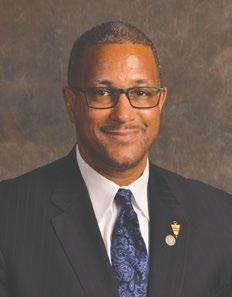
(ECS) grant, has long been criticized for its inequities. School districts should advocate for reforms that ensure fair and adequate funding for all communities. By lobbying the Connecticut General Assembly, districts can push for adjustments to the ECS formula that account for the true costs of complying with mandates, particularly in high-need areas.
Districts can collaborate with educational associations, such as the Connecticut Association of Boards of Education (CABE), in mandate relief advocacy. This could include requesting waivers, modifications, or the repeal of mandates that impose excessive costs without significantly improving educational outcomes. For example, streamlining reporting requirements or providing flexibility in teacher evaluation processes can reduce administrative burdens.
The state can encourage regional collaboration among districts to address shared challenges. By providing incentives for regionalization, such as additional funding or technical support, the state can help districts pool resources and reduce costs associated with mandates. For instance, regional special education programs can offer high-quality services more efficiently than individual districts.
Connecticut’s state government can support pilot programs and innovation grants that allow districts to experiment with cost-effective solutions for mandate compliance. For example, pilot programs in virtual learning or alternative transportation models can provide valuable insights into reducing
Mission:
Vision:
EXECUTIVE COMMITTEE
Leonard Lockhart | President, Windsor
Meg Scata | First Vice President, Portland
Lon Seidman | Vice President for Government Relations, Essex
Eileen Baker | Vice President for Professional Development, Old Saybrook
Anthony Perugini | Secretary/Treasurer, Cheshire
Elizabeth Brown | Immediate Past President, Waterbury
Lydia Tedone | NSBA Director, Simsbury
Ethel Grant | Member at Large, Naugatuck
AREA DIRECTORS
Marion Manzo | Area 1 Co-Director, Region 15
Thomas van Stone | Area 1 Co-Director, Waterbury
Jennifer Hockenhull | Area 2 Co-Director, Hartford
Lisa Simone | Area 2 Co-Director, Bloomfield
Julia Dennis | Area 2 Co-Director, Berlin
Karen Colt | Area 3 Co-Director, Vernon
Sara Kelley | Area 3 Co-Director, Stafford
Chris Stewart | Area 4 Co-Director, Putnam
Ailla Wasstrom-Evans | Area 4 Co-Director, Brooklyn
Chris Gilson | Area 5 Co-Director, Newtown
Tina Malhotra | Area 5 Co-Director, Ridgefield
Lee Goldstein | Area 6 Co-Director, Westport
Jill McCammon | Area 6 Co-Director, Darien
John Hatfield | Area 7 Co-Director, Seymour
Melissa Mongillo | Area 7 Co-Director, Derby
Edward Strumello | Area 7 Co-Director, Seymour
Lindsay Dahlheimer | Area 8 Co-Director, Region 13
Seth Klaskin | Area 8 Co-Director, Madison
Kim Walker | Area 8 Co-Director, Westbrook
ASSOCIATES
Jaime Barr Shelburn | Associate, East Lyme
Ethel Grant | Associate, Naugatuck
Becky Tyrrell | Associate, Plainville
COMMITTEE CHAIRS
Lee Goldstein | Chair, Federal Relations, Westport Laurel Steinhauser | Chair, Resolutions, Portland Lindsay Dahlheimer | Chair, State Relations, Region 13
CITY REPRESENTATIVES Jennifer Perez | City Representative, Bridgeport Francoise Deristel-Leger | City Representative, Hartford
Rivera | City Representative, New Haven
Koc | City Representative, Stamford
Ireland | City Representative, Waterbury
VALEDICTORIAN
Connecticut Business Systems –
A Xerox Company
Finalsite
SALUTATORIAN
Berchem Moses PC
Pullman & Comley
Shipman & Goodwin
HONOR ROLL
JCJ Architecture
Kainen, Escalera & McHale, P.C.
Newman/DLR Group
Solect Energy
SCHOLAR
Blue Line Solutions
Brown & Brown
Chinni & Associates, LLC
Coordinated Transportation Solutions Dattco, Inc.
ESS
Franklin Covey
GWWO Architects
The Lexington Group Perkins Eastman
The S/L/A/M Collaborative Zangari Cohn Cuthbertson
Duhl & Grello, P.C.
EDUCATIONAL AFFILIATES
Above Line Solutions
American School for the Deaf Area Cooperative Educational Services (ACES)
Booker T. Washington Academy
Cambridge International
Capitol Region Education Council (CREC)
Connecticut Alliance of YMCAs
Connecticut Arts
Administrators Association
Connecticut Association for Adult and Continuing Education (CAACE)
Connecticut Association of School Business Officials (CASBO)
Connecticut School Buildings and Grounds Association (CSBGA)
Connecticut Technical High Schools
Cooperative Educational Services (C.E.S.)
EASTCONN
EdAdvance
EDC Solutions
Explorations Charter School
Great Oaks Charter School
Integrated Day Charter School
ISAAC
LEARN
New England Science & Sailing Foundation
Odyssey Community School, Inc.
The Bridge Academy
Patrice McCarthy Executive Director & General Counsel,
CABE
The arrival of May always causes my thoughts to turn to gardening. For generations my Mother’s family were farmers, so I suspect my desire to grow flowers and vegetables is inherited –and certainly pleases the deer in our neighborhood.
Cultivating plants has many similarities to cultivating leadership. In his book Always Growing, Jones Loflin uses the analogy of a leader as a gardener. His observations are applicable to boards of education as well as to associations like CABE.
Gardeners grow, prune, cultivate and harvest. How does that apply to leadership for boards of education?
Growing a strong board involves developing a shared understanding of the roles and responsibilities of the board and superintendent. Taking advantage of professional development opportunities will support this growth. Building trust within the board is another element that supports growth. Clear, transparent communication contributes to building trust and demonstrates to the community that the board is committed to collaboration.
Adopting a strategic plan and board goals enables board members to focus on a common purpose – and a path to reach these goals. The process of developing the strategic plan and board goals contributes to the growth of the board as a collective group.
PRESIDENT (continued from page 2)
costs while maintaining educational quality.
Strengthening Stakeholder Representation
To ensure that future mandates are realistic and adequately funded, the Connecticut General Assembly should involve educators, administrators, and other stakeholders in the policymaking process. By consulting those directly affected by mandates, legislators can better understand their financial and operational implications.
One of the most effective ways to
The need to prune is never more apparent than during the challenging budget development process. The budget reflects the priorities of the board within fiscal constraints. Hard decisions are made to evaluate existing programs and services, sometimes eliminating some to support another initiative. A focus on accountability enables the board to evaluate programs objectively and make informed decisions.
Effective boards of education cultivate an environment where the board/superintendent leadership team can grow and flourish – and by doing so creates that same environment for students and staff. The unique needs of each board member, student and staff member must be identified and supported. Boards of education create the conditions for success by developing policies and providing resources to serve students. Consistent attention to a positive climate fosters the growth of students as learners and the board as a governing body.
Celebrating the harvest brings joy to the gardener – and boards of education should take the opportunity to celebrate the successes of the students and the district. Some fruits of the harvest will take years to mature – such as when your students enjoy productive, meaningful lives as adults. There are many uncertainties faced by gardeners and board of education members – changing weather patterns,
address unfunded mandates is to build a unified voice among Connecticut’s school districts. By joining forces through organizations like CABE, CAPSS, and the teacher unions, districts can amplify their advocacy efforts and push for systemic change. A coordinated approach ensures that the concerns of educators, parents, and students are heard at the state level.
Unfunded educational mandates from the Connecticut General Assembly pose significant challenges for school districts, particularly in terms of financial sustainability and resource allocation. However, by adopting a proactive and collaborative approach, districts can address
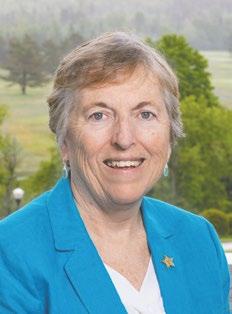
hail, frost, drought – and changes in funding and mandates. A good harvest is not guaranteed, despite our best efforts, but our resilience empowers us to adapt. Taking the time to recognize accomplishments energizes the board and the district to support continued growth.
Loflin notes that “leaders create the environment that gives the people the best chance to grow.” Let’s all strive to be that leader.
I hope your board and your gardens flourish this season!
CABE DEI Consultant Dr. Martha Brackeen-Harris received SERC’s George A. Coleman Excellence in Equity Award in March. Dr. Brackeen-Harris’s life’s work has been committed to ensuring all Connecticut students are valued and respected in their school experience. Please join us in congratulating Martha!
these challenges both locally and at the state level. Through strategic budgeting, community engagement, partnerships, and advocacy for policy reforms, Connecticut’s school districts can mitigate the impact of unfunded mandates while continuing to provide high-quality education. Achieving this balance requires a shared commitment to equity, innovation, and collaboration among all stakeholders, ensuring that the state’s education system remains a cornerstone of opportunity and growth for every student. It truly begins at the local level and we are here to support you.
Thomas B. Mooney, Esq. Shipman & Goodwin
The Nutmeg Board of Education makes many mistakes. The latest imbroglio created by the board will be reported here each issue, followed by an explanation of what the board should have done. Though not intended as legal advice, these situations may help board members avoid common problems.
With the arrival of warmer weather and longer days, the Nutmeg Board of Education has been in the “expulsion season” in recent weeks, that special time of the year when in the exuberance of spring some students push past the boundaries of acceptable behavior. Some members of the Nutmeg Board actually relish the opportunity to sit in on such hearings, because they are able thereby to get a look at the inner workings of the Nutmeg Public Schools. Veteran Board member Bob Bombast, however, was sick of sitting through lengthy expulsion hearings, and he decided to do something about it.
Bob Bombast started with the current Board policy on student discipline, which describes conduct for which students may be expelled as well as the related procedures for expulsion hearings. The procedures set forth in the Board policy in Nutmeg reflect statutory requirements, including the need for at least three affirmative votes for an expulsion vote to be effective. Bob relied on another provision in the expulsion statute, however, to propose that all expulsion hearings will be heard by a hearing officer selected by the Superintendent.
Given the affection some Board members in Nutmeg have for conducting expulsion hearings, Bob knew that he had some work to do to convince his fellow Board members to go along with these changes. Rather than bring the proposed changes to the Board in a public meeting, Bob sent his edits of the Board policy to the other Board members in an email for their consideration. In his email, Bob warned his fellow Board members against replying “all” to avoid the Board’s inadvertently conducting an illegal, unposted meeting through email discussion among a quorum. However, he did invite Board members to call him individually so that they could discuss his suggested edits.
Bob’s email evoked quite a re-
sponse from the Board members. Some called Bob to say that they agreed that the Board members have better things to do than to sit through expulsion hearings. However, others claimed that personally sitting on expulsion hearings was an important responsibility that they should fulfill as Board members.
Through these conversations, Bob concluded that he would not be able to gain Board consensus over email on the changes he was proposing to the student discipline policy, but he was still apprehensive about hashing this issue out at a public Board meeting. Then, inspiration struck. Bob labeled his edited version of the student discipline policy as a “DRAFT” so that the Board could discuss his edits to the Board’s student discipline policy in executive session. At Bob’s request, therefore, one of the agenda items for the May Board meeting was “Discussion of Draft Board Policy (discussion proposed for executive session).”
When the Board reached that agenda item at the meeting last evening, Nancy Newshound, ace reporter for the Nutmeg Bugle, stood up and shouted, “Point of Order!” When Ms. Chairperson recognized Nancy, she claimed that the Board could not convene into executive session to discuss a Board policy, draft or not. But Bob was prepared.
“Nancy should read the Freedom of Information Act!” Bob responded. “Connecticut General Statutes Section 1-200(6) defines executive session as including “discussion of any matter which would result in the disclosure of public records or the information contained therein described in subsection (b) of section 1-210,” and Section 1-210(b) includes “Preliminary drafts or notes” in the list of records that may be kept confidential
Did Bob’s response appropriately address the concern about executive session?
Bob’s review of the Freedom of Information Act here was incomplete, and the Board did not have the right to discuss Bob’s edits to its student discipline policy in executive session.
Bob was correct in two respects. First, boards of education have the right to convene in executive session for the purpose of discussing the information contained in records that are exempt from disclosure in accordance
with Conn. Gen. Stat. § 1-210(b). Boards of education frequently utilize this provision for executive session for various reasons. For example, any discussion of information that is contained in confidential student records must be held in executive session, and such is the case in expulsion hearings, when board members receive confidential information about a student’s disciplinary record as well as academic and other student records. Other times when boards may convene in executive session for this purpose include discussion of confidential attorney-client communications, discussion of responses to requests for proposals, and discussion of “records, reports and statements of strategy or negotiations with respect to collective bargaining.”
Second, Bob was correct in stating that “preliminary drafts or notes” are also exempt from disclosure in accordance with Conn. Gen. Stat. § 1-210(b). However, there is more to the story. Preliminary drafts or notes are exempt only if “the public agency
has determined that the public interest in withholding such documents clearly outweighs the public interest in disclosure.” That determination can be made if and when the confidentiality of a preliminary draft is in question, and thus this further condition on the confidentiality of preliminary drafts or notes is typically not a problem.
The fatal flaw in Bob’s argument is a separate provision in the Freedom of Information Act, which Bob apparently overlooked. Conn. Gen. Stat. § 1-210(e)(1) provides that the exemption from disclosure of preliminary drafts or notes does not apply to:
1. Interagency or intra-agency memoranda or letters, advisory opinions, recommendations or any report comprising part of the process by which governmental decisions and policies are formulated . . . (Emphasis added)
Given this exception to the preliminary draft exemption, a draft that is discussed by board of education members is not a “preliminary
See SEE YOU IN COURT page 6


Below are the highlights of activities that the CABE staff has undertaken on your behalf over the last month. We did this:
By providing opportunities for members to learn how to better govern their districts:
z Presented a workshop on Robert’s Rules and FOI for the Bloomfield Board of Education.
z Facilitated training sessions on Developing a Strong Governance Team and the Board/Superintendent Relationship for the Bridgeport Board of Education.
z Facilitated a Self-Assessment for the Bridgeport Board of Education.
z Responded to 34 requests for policy information from 23 districts, providing sample materials on policy topics. Further, districts continue to access CABE’s Online Core Policy Reference Manual and/or online manuals posted by CABE for policy samples. The topics of greatest interest were those pertaining to Restorative Justice and School Climate Policy.
z Provided support to board members and central office administrators regarding policy matters.
By ensuring members receive the most up-to-date communications:
z Provided a Policy Highlight, via e-mail, with information regarding Amending School Security and Safety Policies to Include New Act DEI Compliance.
z Staffed meeting of CABE Area Directors.
By promoting public education:
z Presented Bonnie B. Carney Communications Awards to Glastonbury Board of Education.
By providing services to meet member needs:
z Staffed CABE’s Day on the Hill.
z Discussed superintendent search process with the Brookfield Board of Education
z Responded to a variety of legal inquiries from members.
z Participated in meetings with several board chairs and superintendents to plan upcoming board workshops.
z Responded to numerous calls and emails from board of education members and superintendents.
z Working with a district Policy Chair and IT Director on policy components related to AI.
z Working with the State Board of Education and the Digital Learning Advisory Council on developing “AI B est Practices in Schools.”
z Participated in a planning committee organized by the SDE’s Math and Computer Science Consultant to bring a screening of the movie Counting Out to Connecticut.
z Working with a district to develop a school decommissioning process.
z Working with an urban board of education on revising its bylaws to establish greater collaboration and consensus-building.
z Prepared materials, as part of the Custom Update Policy Service, for Marlborough, New Fairfield, and New Hartford
z Prepared materials, as part of the Custom Policy Service, for the Seymour, Shelton, Stamford, West Haven, and Woodbridge Public Schools.
z Preparing a Policy Audit for the Andover and Wilton Public Schools.
z Currently assisting the Farmington, Region 13, Stratford, Voluntown, and Windham Boards of Education with their superintendent searches.
z Staffed monthly Board Chair CheckIn.
By helping districts operate efficiently and conserve resources:
z Posted policies online, as part of the C.O.P.S. Program for, Branford, Derby, Griswold, New Fairfield, New Hartford, Sherman, Sterling, and Voluntown
By attending Professional Development to strengthen staff knowledge and skills:
z Attended NSBA State Association Counsel meeting.
z Attended NSBA Council of School Attorneys Seminar.
z Attended NSBA Annual Conference
z Attended CT Society of Association Executives (CSAE) webinar on How Effective Non-Profits Respond When Markets Drop
By representing Connecticut school boards on the state or national level:
z Participated in CT Educator Preparation and Certification Board meetings.
z Provided media interviews on state and federal funding, US DOE directives, and segregation.
z Provided workshop on Practices to Avoid Legal Liability at NSBA Annual Conference.
z Attended Increasing Educator Diversity meeting.
z Convened High School Graduation Requirements Working Group
z Participated in Congresswoman Rosa DeLauro’s press conference on federal funding.
z Convened Professional Development Mandates Working Group.
z Attended a Discovering Amistad Board of Directors meeting.
z Participated in meeting of State Association Executive Directors
z Participated in meeting of CT members of the New England School Public Relations Association (NESPRA).
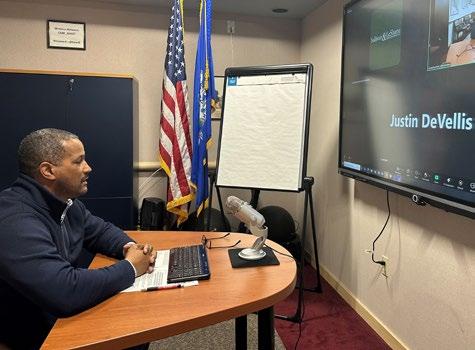
SEE YOU IN COURT (continued from page 4)
draft” and is not exempt from disclosure. Accordingly, the Board was not privileged to discuss Bob’s edits of the student discipline policy in executive session as Bob had proposed.
Two other points here are worthy of note. First, boards of education are authorized by Conn. Gen. Stat. § 10-233d to “establish an impartial hearing board of one or more persons” to conduct expulsion hearings and render final decisions, provided that a board member may not be appointed to serve in that capacity. Once a board has established an impartial hearing board to conduct a hearing, board members have no further role in such hearings. However, boards are free to decide whether they will delegate this authority in all such cases or only some of the time. Moreover,
given their oversight role, boards may authorize one or more board members to observe such hearings on a limited basis and report back to the full board to determine whether such delegation to an impartial hearing board should continue.
Finally, Bob’s proposal that the Superintendent select the hearing officer was inappropriate. Due process requires an impartial decision maker. As the proponent of expulsion, a superintendent is not impartial, but the board or its designee must be. Accordingly, the board itself should select the impartial hearing officer to hear such cases.
Attorney Thomas B. Mooney is a partner in the Hartford law firm of Shipman & Goodwin who works frequently with boards of education. Mooney is a regular contributor to the CABE Journal. Shipman & Goodwin is a CABE Business Affiliate.
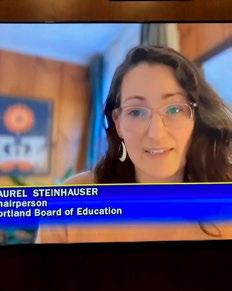
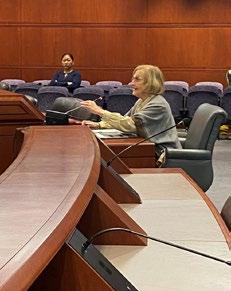
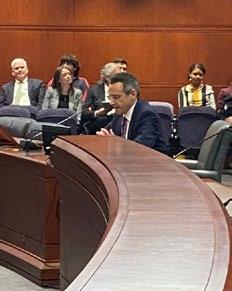
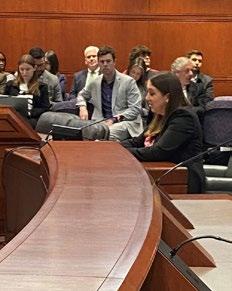

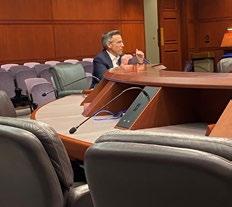
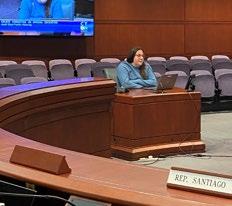
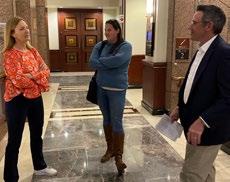
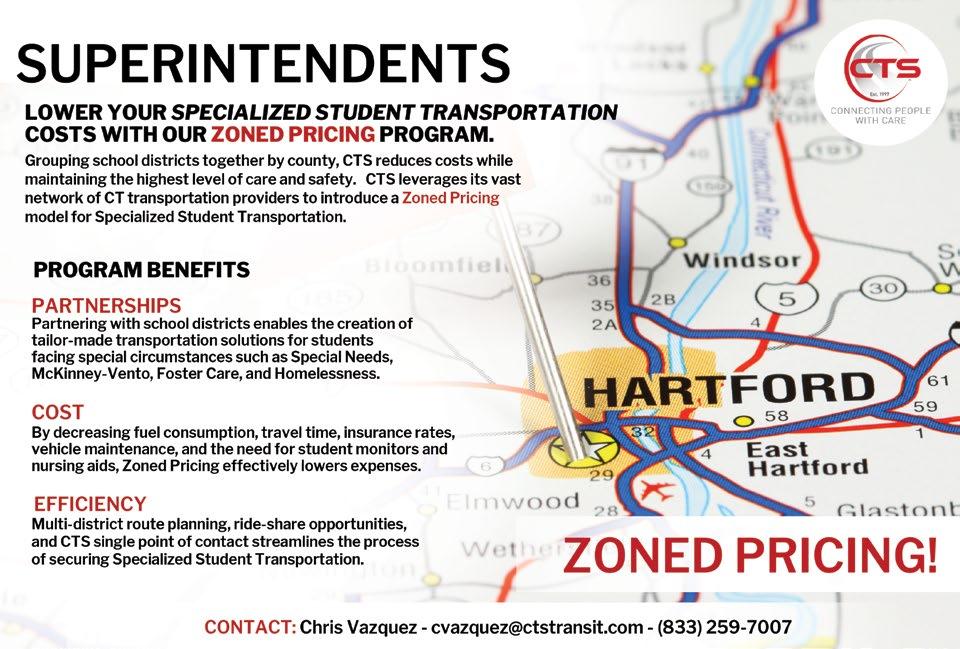
Nicholas D. Caruso, Jr. Associate Executive Director for Field Service and technology, CABE
At the time I’m writing this article, there are over 20 active superintendent searches ongoing in Connecticut. Whether the new appointees are experienced superintendents or others dipping their toes into the superintendency pool for the first time, it’s in the best interest of the leadership team to start off on the right foot. While the interview process gives insight into how the leadership team may function, once the new candidate is safely ensconced in his or her office a new dynamic takes over. Some lines of communication may get muddied, or the delineation of the various roles of board members and staff can get murky.
A great way to start off on the right foot is to let CABE facilitate a retreat between the board and their new superintendent to consider potential issues and how they might affect the relationship of the leadership team members. Most important is a discussion of the common areas that can
cause trouble, and how to keep that from happening.
Some potential conflict areas include:
1. Communication between the board members and the superintendent. Some superintendents have a total open-door policy and encourage board members to reach out while others look to the Board Chair to act as a filter. Neither way is necessarily better or worse, but there should be an understanding of how it is going to work in your district.
2. Communication between board members and staff.
In most districts the expectation is that the board works through the Chief Executive Officer and contact with staff is limited where that takes place; particularly if the board member is “directing work”, rather than trying to observe and learn.
3. Hiring of administrative personnel (both Central Office
as well as the building level administrators). Practices vary among districts – does the board take a more active role in hiring senior administrators, or do they allow the superintendent to pick their own cabinet? Does the superintendent bring one candidate to the board for approval, or does the board make the decision from a list of semifinalists?
4. Hiring of other staff. Make it clear that the superintendent is responsible for hiring all staff
5. Protocols for establishing agenda topics or getting things on the superintendent’s radar screen. While the superintendent generally takes the first stab at creating meeting agendas, with the consent of the board chair, it is often unclear just how other board member get things on the board’s or superintendent’s radar screen. Having a conversation about this
before it becomes problematic is a good way to ensure a more harmonious relationship.
6. Protocols for visiting schools. Another common area of conflict, establishing rules for board member visits is a good way to prevent conflict down the road.
These are a few of the more common issues – your district may have a unique issue that doesn’t fit the mold. It’s best to bring it out as part of a general conversation than to have to deal with it when it rises to the level of a crisis.
For this type of work, I generally meet with the board chair (or Executive Committee) and superintendent ahead of time to plan for any topics that are particularly important to cover for this district.
If you are interested in having a board retreat for this topic, or any other, please contact me at ncaruso@cabe. org or call me at 860-571-7446.
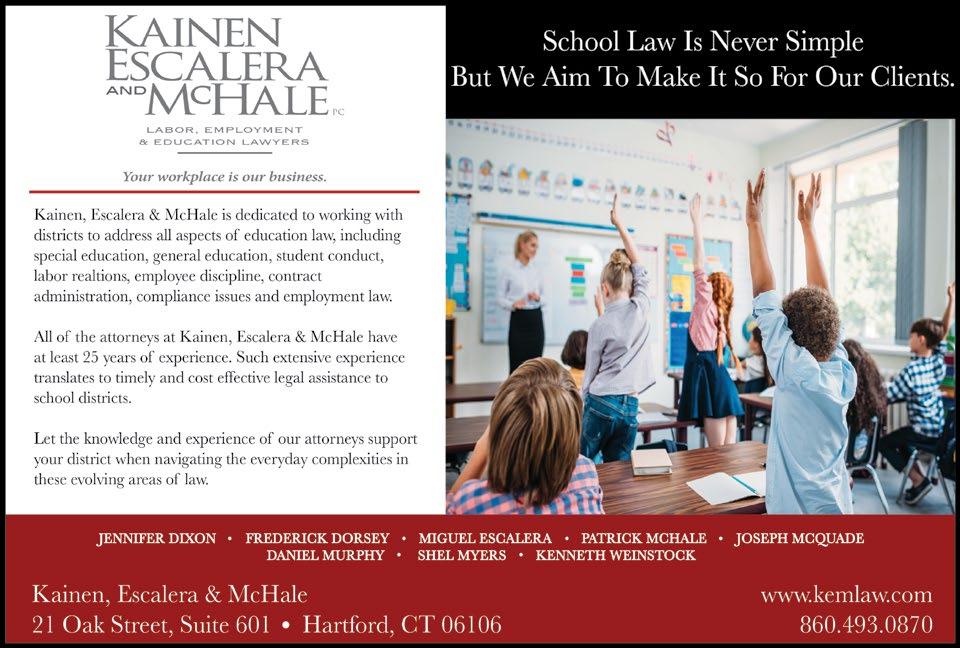
For the school year commencing July 1, 2025, and each year thereafter, each local and regional board of education is required to adopt and implement the Connecticut School Climate Policy. This policy was developed by CABE with technical and substantive guidance from the Commission on Women, Children, Seniors, Equity, and Opportunity (CWCSEO) and other members of the statewide Social Emotional Learning and School Climate Collaborative.
The policy was developed to provide districts guidance on recent revisions to Connecticut’s school climate law, Public Act 23-167, An Act Concerning Transparency in Education. Since the policy was drafted and approved by the Commission in December 2023, districts were able to adopt and implement the new policy for the remainder of the 2023-24 school year or for the school year commencing July 1, 2024. All remaining districts are now required to have this policy (5131.911) on or before July 1, 2025.
In most cases, state-mandated policies require that boards adopt their own policies through deliberations, as long as the final version reflects the statutory requirements. Even in the case of adopting the highly legalistic, technical, and mercurial Title IX policy, for example, districts can adopt their own policy language from various models available, such as CABE’s, as long as their adopted policies include the regulations and procedures developed through the U.S. Department of Education.
Through Public Act 23-167, the General Assembly requires districts to adopt the Connecticut School Climate Policy as written. Along with CABE’s
School Climate Policy (5131.911) approved and published in December 2023, the SEL Collaborative under the Commission on Women, Children, Seniors, Equity and Opportunity (CWCSEO) has developed model surveys for districts, a School Climate Improvement Template, and a Challenging Behavior Reporting form. These resources are available on CABE’s website and included as resources with the CABE policy.
Along with these resources, the Connecticut State Department of Education (CSDE) published its Connecticut School Climate Guidance in April. This informative resource provides an overview of the transformative change in how districts respond to what is now referred to as “challenging behaviors.” Previous to the new law, districts were required to react to reports of bullying, investigate the matter, adhere to timelines and reporting requirements, determine whether the alleged incident reached the statutory threshold of bullying, and administer punishments following the completion of due process.
The new law prioritizes providing the structures that support a positive school climate, thus diminishing the chances of challenging behaviors rising to the level of bullying. Through a continuous improvement process, districts will be required to allocate their time towards establishing these structures, administering and reviewing surveys, and using this and other collected data in their Climate Improvement Plans.
In essence, the new law aims to allow districts to allocate time and resources to prevention rather than reaction. Rather than beginning with a report of bullying, only to determine through an investigation that the behavior fell short of the statutory definition, an investigation now begins with a report of “challenging behavior.” Through an investigation, the school administration must determine whether that behavior can be addressed through a restorative approach, as outlined in the district’s Restorative Practices Policy. The new law requires districts to adopt a Restorative Practices Policy, which, unlike the CT School Climate Policy, may be developed and adopted by individual districts. (CABE’s model policy on Restorative Practices – 5144.12 - is available upon
request for member districts).
For boards of education, CSDE’s Connecticut School Climate Guidance is a valuable resource in helping communicate these significant changes to parents and community members. Most notably, the guidance provides an excellent legislative summary, which provides an overview of statutory requirements.
School and district administrators will likely find the section in Appendix B valuable, as it provides protocols for “tiered response” and supports. Beyond what the new school climate policy defines, a subset of challenging behaviors requires districts to respond with tiered interventions or “tiered response incidents.” Defined in the statutes, a tiered response is required for an incident of challenging behavior that meets any of the following criteria:
a. Requires temporarily clearing a classroom or removing a majority of students to reduce the likelihood of injury;
b. Indicates a credible intention to cause bodily harm to self or others; or
c. Results in an injury requiring medical attention beyond first aid (or less severe injuries caused by the same person on more than one occasion, as verified by a school nurse or other medical professional). The law provides that if a district determines that conduct meets the above criteria, school climate improvement plans must include tiered responses corresponding to the incidents.
The CSDE Guidance provides clear and concise information that will
assist boards and superintendents in explaining and implementing the new policy. CABE’s policy department will include this Tiered Response framework as a model regulation for the CT School Climate Policy.
In our continuing effort to assist boards of education in maintaining their policy manuals to ensure compliance with changing laws and meet the demands of changing times, CABE’s Policy Department is offering an Enhanced Policy Audit Service. While continuing our policy audit practice, providing a comprehensive review of the district policy manual ensuring it meets all required standards, this new service will provide the district with:
• A detailed report highlighting the strengths and weaknesses of the district policy manual
• All district missing mandated policies provided in both hard copy and electronically
• Modifications made to existing mandated policies to bring them into compliance, also provided in both hard copy and electronically. These mandated policies will be ready to go before the Board for adoption.
For districts seeking a more targeted approach, we also offer a policy series development for member boards, which targets any specific policy area for review and recommended updates.
For more information regarding this new product and other policy services, please call CABE’s Policy Department at 860-571-7446.

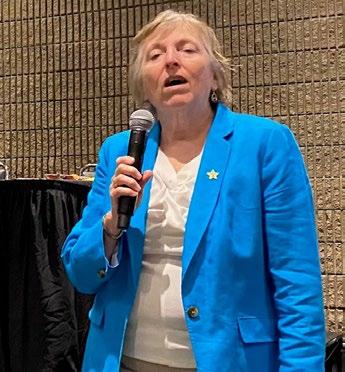
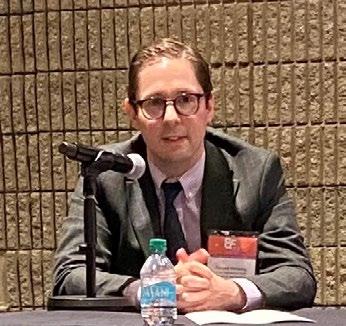

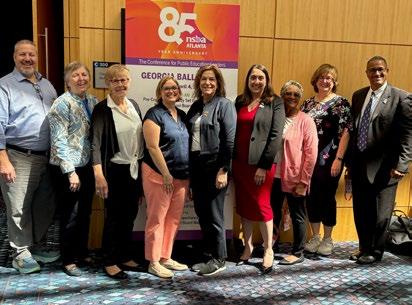
(continued from page 1)
Congress to provide greater and sustained resources for local programs that are critical to school safety, including school resource officers, school counseling, interagency coordination, and mental health services.
• Individuals with Disabilities Education Act (IDEA), calling on Congress to meet the federal funding commitment.
CABE staff was also involved in delivering professional development during the Conference. Patrice McCarthy and Conrad Vahlsing presented a workshop on Ten Practices to Avoid Legal Liability
CABE Deputy Executive Director Lisa Steimer attended a number of sessions focused on communications at the Conference. One of the sessions
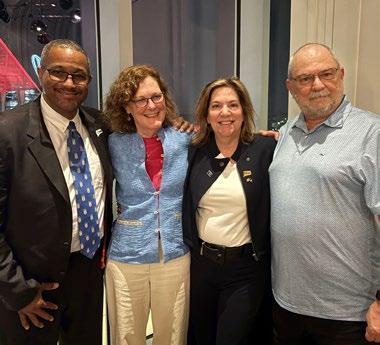
Lisa attended was Communicating through Crisis and Controversy, which was presented by Chris Horan of Horan Communications. Some may remember that Chris delivered the Saturday morning keynote at the 2024 CABE/CAPSS Convention. Communicating through Crisis and Controversy is a timely topic that has great value for board members and superintendents alike. We are delighted that this session will be offered as a breakout session at the 2025 CABE/CAPSS Convention.
Lydia Tedone, Past President of CABE and a member of the Simsbury Board of Education, concluded her term on the NSBA Board as the Chairman of the National American Indian/Alaska Native Council of School Board Members. Meg Scata served on the Northeast Region Nominating Committee.
We are sad to say goodbye to Coordinator of Finance and Administration, Wendy DeBarge. Wendy joined the CABE staff in September of 2022 and worked closely with staff leadership, the Finance Committee, and Board of Directors to ensure CABE’s financial resources remained strong. We wish Wendy well as she starts a new chapter in her life!

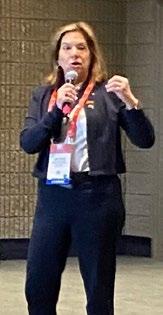

As we say goodbye to Wendy, we welcome Joanna Iannucci to the CABE team. Joanna has worked in finance and facilities for a number of years. She brings this wealth of experience to CABE as she ensures that CABE has the resources to continue to meet the needs of our members.
Join us in wishing Wendy well and welcoming Joanna!
Ajit Gopalakrishnan, Chief Performance Officer and John Frassinelli, Division Director of School Health, Nutrition and Family Services at the



Connecticut State Department of Education presented the annual school discipline report to the State Board of Education. They began their remarks by saying SDE has efforts in place to support students so that educators can address behaviors earlier to prevent suspensions and expulsions.






The demographic breakdownsabout 7 percent of students (37,000) experience an exclusionary discipline. 1 out of 7 are Black/African American students, 1 out of 11 Hispanic/Latino students and 1 out of 14 White students.
Eight graders were expelled in larger numbers in the 2023-2024 year than in pre pandemic years. Of note was the realization that lagging student maturity growth is noticed in this age group due to COVID 19.
Pre k-second grade, less than 900 students — less than ½ of 1 percent were suspended, a decline of 17.2 percent from 2017-2028.
Of the 10 incident types, the two largest increase since 2018-2019 are physical and verbal confrontation up 44 percent and personally threatening behavior up 32 percent and the largest decrease was sexual related behavior
down 30 percent since 2018-2019.
SDE continues to utilize the Connecticut School Discipline Collaborative to engage in current discussions and push out best practices. The report states-The primary focus (of the Collaborative) is to reduce the overall use of exclusionary discipline measures and also to specifically address and mitigate the disproportionate impact these practices have on certain student populations, as outlined in the data above.
Some of the supports mentioned include ESSER grants to support 92 imbedded social workers, school counselors and school psychologists in local schools and high dosage tutoring.
SDE promotes their work on the components of social emotional intellectual habits by providing trainings to school counselors to have students understand expected behaviors.
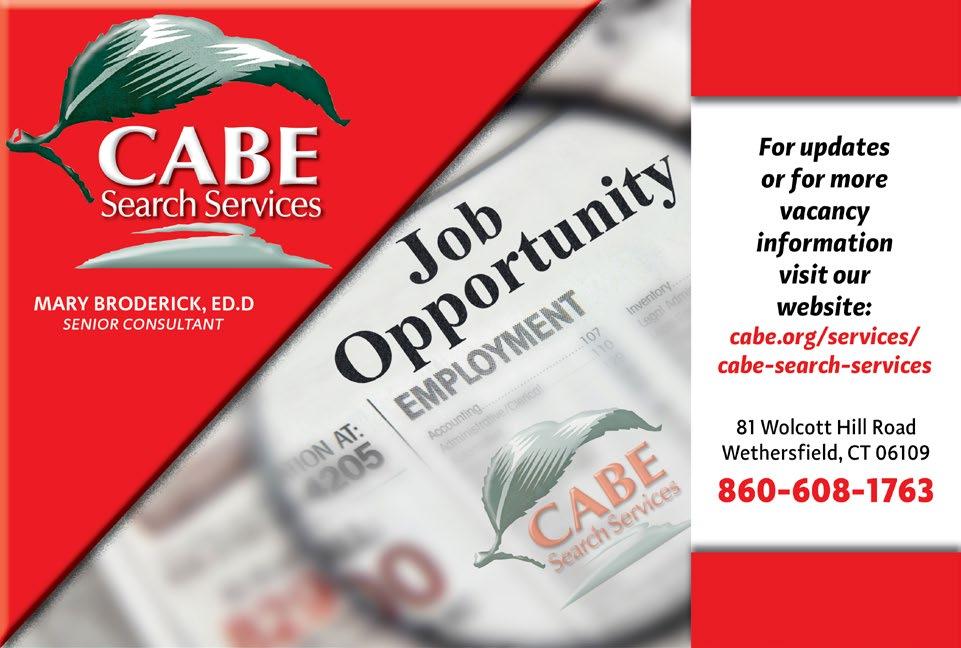
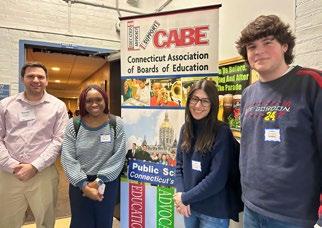
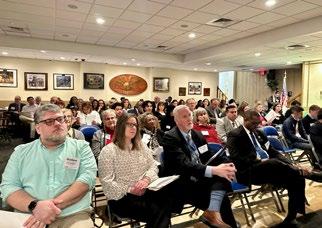


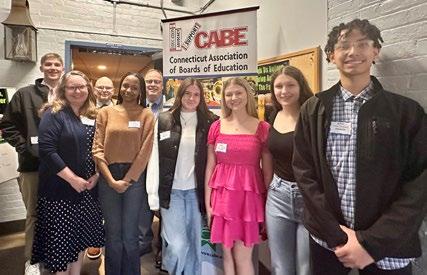
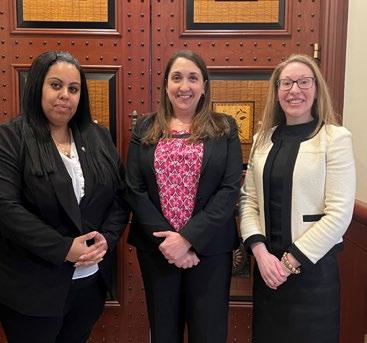
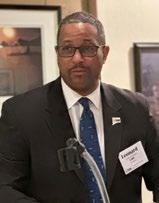
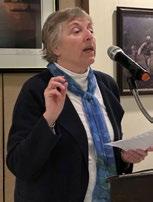
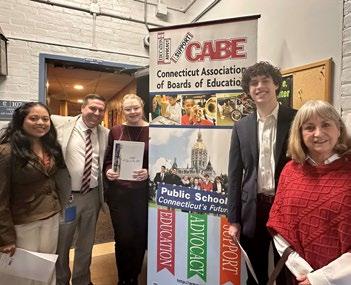
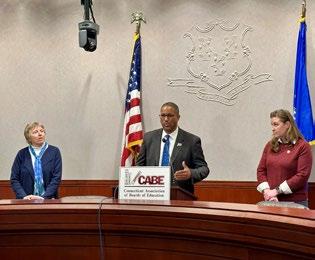

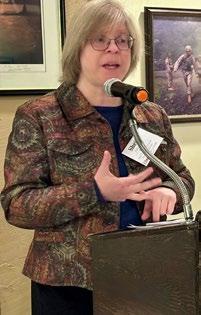

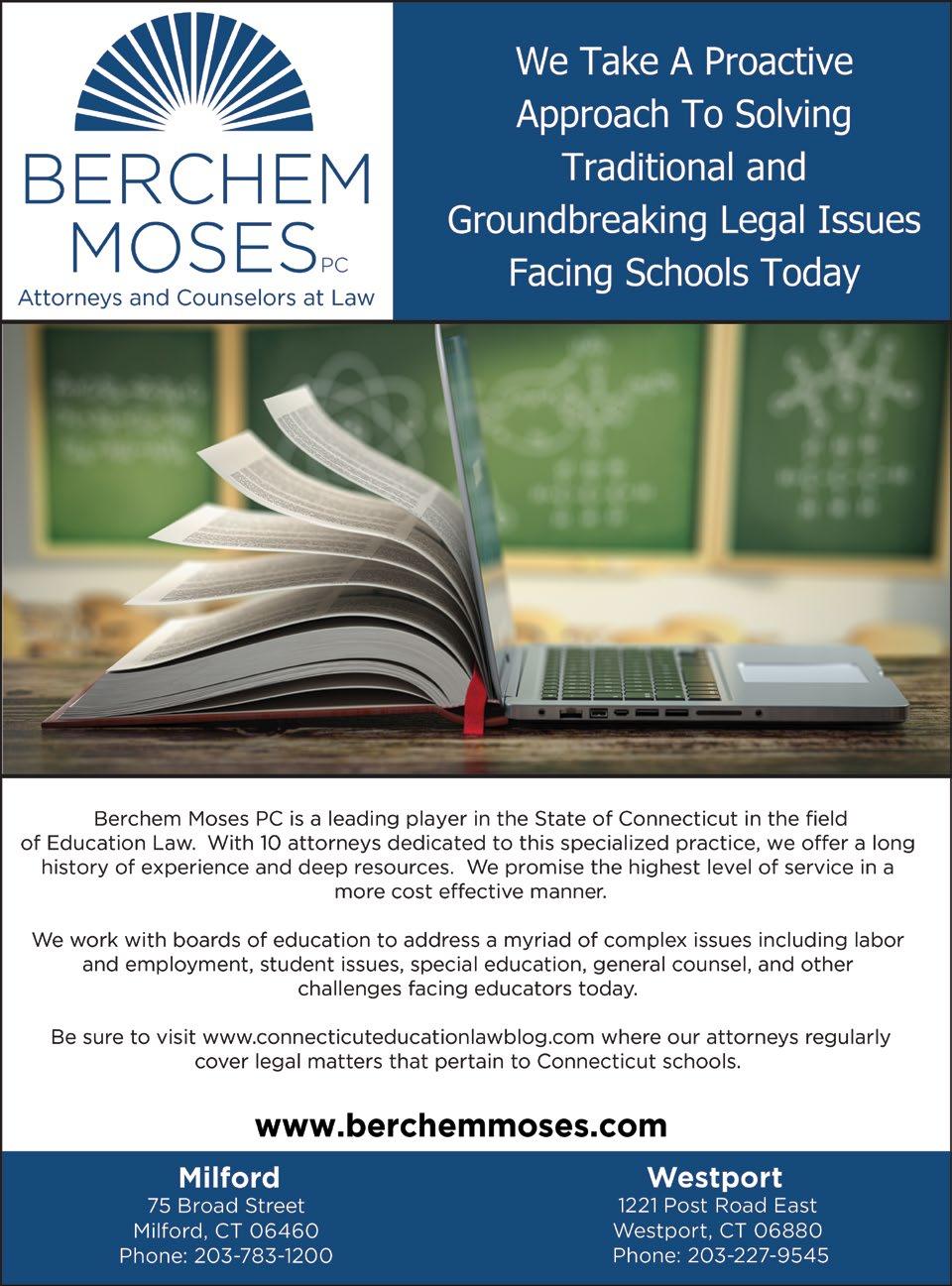

in such a capacity.
At the annual conference of the National School Boards Association (NSBA) in April, CABE attorneys
Patrice McCarthy, Executive Director and General Counsel, and Conrad Vahlsing, Deputy General Counsel, presented a well-attended workshop on best practices for school leaders hailing from across the country.
The workshop was titled Ten Best Practices to Avoid Liability and the audience was comprised of board of education members and superintendents from myriad states, which poses the challenge of providing meaningful information to leaders who must return to their home school districts and work within disparate legal frameworks.
Even given this tricky set-up, the audience was continually engaged as CABE attorneys offered foundational principles as to what school leaders should be mindful of as they govern their districts.
So, what are these 10 best practices? Here is a quick synopsis of the topics with brief commentary for each:
1. Know the Boundaries of Authority
Board members should understand that there are a variety of sources of law that grant, and restrict, powers in governing public school districts. Derived from federal and state sources, leaders must be aware of statutes, court cases, agency decisions, regulations, and more, in what actions may or may not be allowed, and what may or may not be required.
2. Focus on the Board’s Policy Making Role
Adopting (and updating) policies is a central task for school boards and it takes constant attention as legal frameworks are subject to change. Policy provides a foundation for district decisions and administrative procedures, and boards can craft many policies to reflect their specific communities’ needs and desires.
3. Adhere to Student Discipline Policies
Within legal bounds, boards set codes of conduct for students as well as sanctions. It is important for board members to understand when the board may be involved in student discipline (e.g., expulsion hearings) and to maintain impartiality when acting
4. Understand the Staff Discipline Process
The contours of staff discipline of course depend in part on whether a given employee is part of a union or not. But even most non-union employees have statutory and contractual rights and procedures for discipline, including termination. And leading a public school district means the principles of due process apply (many of the procedures required thereof are hopefully contained in a given contract). Board attorneys are important partners for staff, and student, discipline processes.
5. Review and Adhere to Policies on Holiday Celebrations
Public school districts must be mindful of the First Amendment rights of their students and staff as it relates to religion. The First Amendment contains rights that sometimes create a conflict between personal religious observance and the need for a school district to not “establish” a religious setting (referred to as the Free Exercise Clause and the Establishment Clause). A fine line at times, but an important distinction.
6. Be Familiar with the Laws Governing Board Meetings
Freedom of information (FOI) laws, sometimes designated as open meetings laws in other states, differ across the country. Still, knowing the differences between open/public session and executive session is a common topic. And in Connecticut, we have so-called “non-meetings” which are a list of reasons for which a board can meet without noticing the public (contained in the definition of “meeting” in our state FOI Act, which also lists what is not defined as a meeting). Of course, there are limits to these outlined by case law and agency decisions (as always, talk to your board attorney).
7. Guard Against Nepotism and Conflicts of Interest
Conflicts of interest may happen on occasion and board members should understand when recusal is appropriate. Board policies and bylaws can help create rules about conflicts of interest and nepotism. And some states, such as Connecticut, prohibit
board members from being employed by their own school district.
8. Understand Ethical Considerations for Board of Education Members
Similar to the preceding topic, but this one encompasses more situations and is specific to board members. It is good practice for boards to have a code of ethics that can help guide and restrain their actions. Board members should always be mindful they are looked to as leaders not just in their schools but in their wider communities.
9. Clarify the Roles of Board Members and the Superintendent
Good school governance is defined in part by the ability of leaders, in different roles, to operate along certain lanes of responsibility. Knowing what is an administrative responsibility and what is better suited to (or required as) board action is important. The professional relationship (e.g, trust and communication) between the board and the superintendent is also important and often reflects the school district’s operation as a whole.
10. Plan the Superintendent Search Process Carefully
Given the importance of the board-superintendent relationship, hiring the right superintendent is of course the first step. Confidentiality in the process, to the extent permitted by law, will generally attract the best candidates and boards should consider using a search consultant who can help guide procedures and may have a better view of the hiring landscape across a region (there can be multiple districts looking for a superintendent at the same time). And related to the confidentiality component, board members should understand the state law regarding what part of the process must be conducted in open session, what could be considered a “non-meeting,” and what is allowed in executive session.
The 10 topics are based on the NSBA’s Council of School Attorneys “A School Law Primer.”
